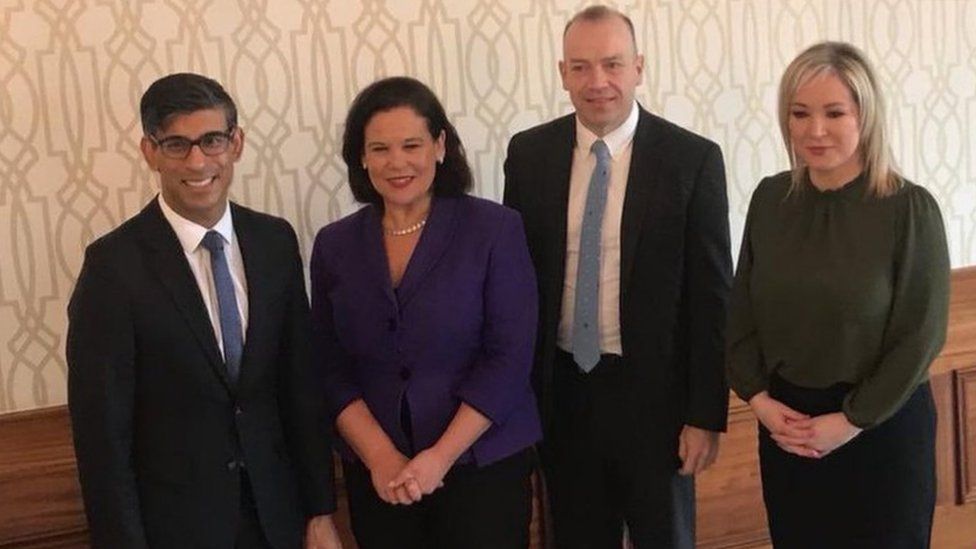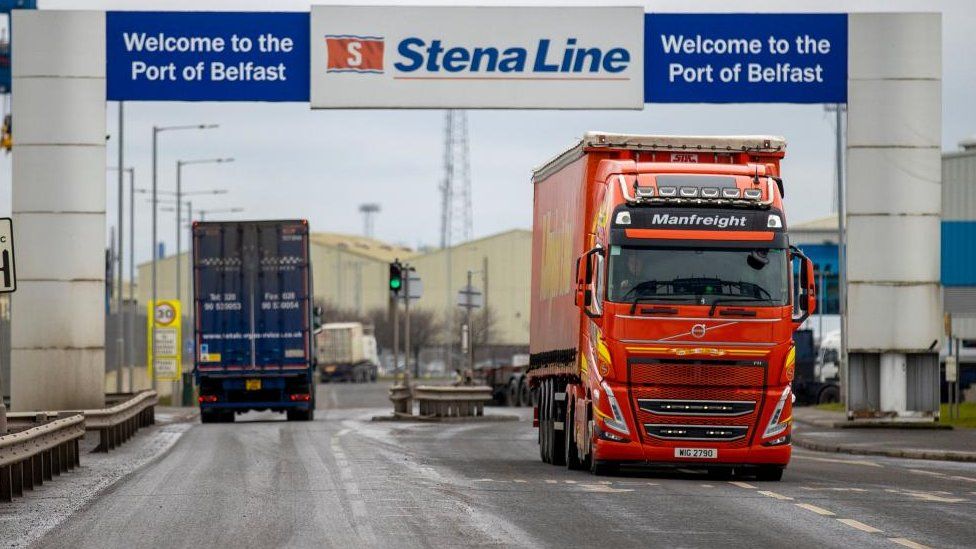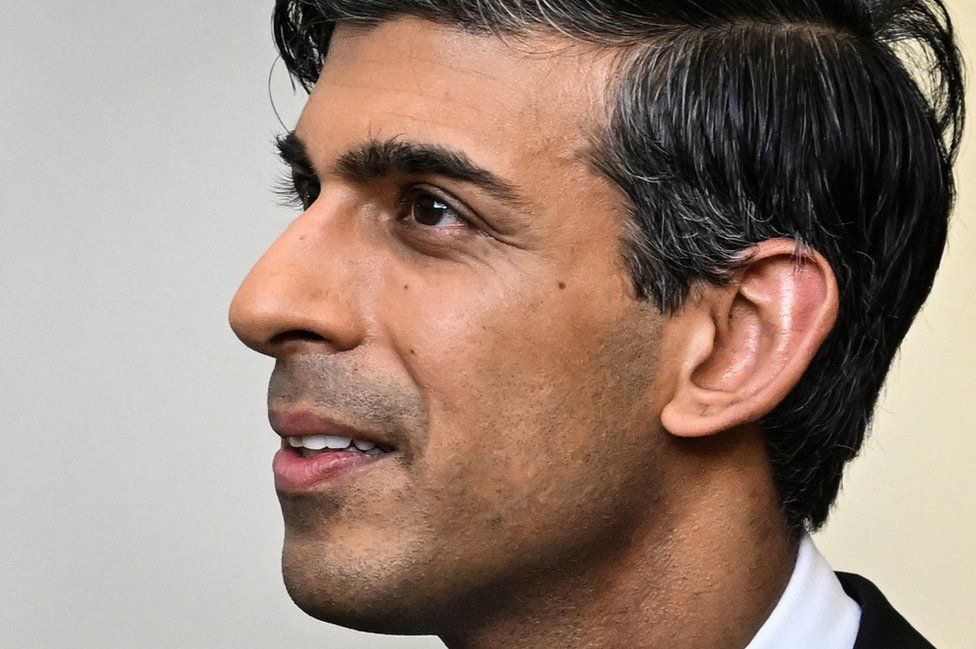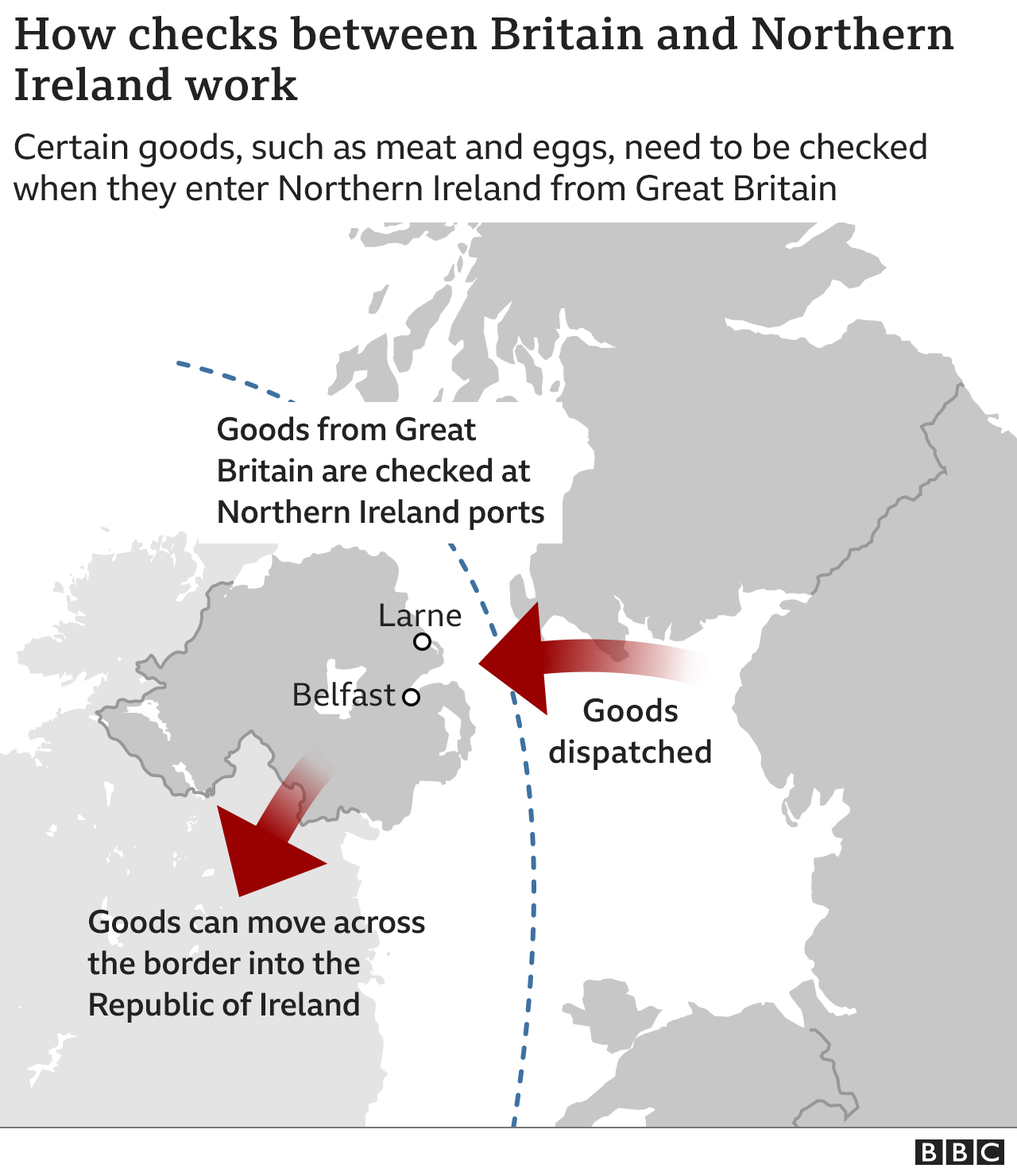
Prime Minister Rishi Sunak is meeting Northern Ireland's political parties amid speculation a deal on the Northern Ireland Protocol could soon be struck.
Sources suggest a deal could be reached as early as next week on post-Brexit trading arrangements.
Mr Sunak will meet party leaders at a hotel near Belfast before travelling to meet EU leaders in Germany.
His foreign secretary is also holding talks with European Commission Vice-President Maros Sefcovic.
The Foreign Office said James Cleverly's meeting was part of an ongoing engagement and constructive dialogue with the EU to find practical solutions that work for the people of Northern Ireland".
The Northern Ireland Protocol is the trade deal that was agreed to ensure the free movement of goods across the Irish land border after Brexit.
Stormont crisis
It is at the heart of a political impasse in Northern Ireland, with unionist parties arguing that placing an effective trade border across the Irish Sea undermines Northern Ireland's place within the UK.
The largest of those parties is the Democratic Unionist Party (DUP), which refuses to take part in Northern Ireland's power-sharing government - introduced in the 1990s as a way of ending decades of violence - unless its concerns are resolved.
Speaking ahead of his party's meeting with the prime minister, DUP MP Sammy Wilson said Northern Ireland should not be legally separate to the rest of the UK.
Even though the DUP came second in May 2022 elections to Sinn Féin - a republican party that accepts the protocol - a new Northern Ireland government cannot be formed without its support.
The DUP has said it must be satisfied with any settlement before it agrees to return to power-sharing.
But the deal has split political opinion and the UK and the EU have been in lengthy negotiations about making changes to how it operates.
It is understood the prime minister held some discussions with the DUP on Thursday evening.


Is a deal done? From what I hear, not quite.
In a way that is obvious because an agreement is not sealed until both sides sign on the dotted line. But diplomats in Brussels agree that a compromise plan isn't quite there, yet.
The political tour that Rishi Sunak and his ministers are going on may be read as the kind of end-game choreography you'd expect to see before an announcement.
But an alternative reading is that the prime minister is going to use today's talks with parties in Northern Ireland, particularly the DUP, to try and then press the EU for final concessions.
It would be a bold play at this stage when multiple sources, close to the talks, have indicated that an announcement next week is within reach.
But this is politics and it's Brexit; it could all still fall apart.
Many eyes will be on Mr Sunak's meeting with the European Commission President, Ursula von der Leyen, in Munich this weekend.
That discussion, I hear, is set to focus on any remaining differences.


What are the main stumbling blocks?
There are two main areas of focus in the UK-EU negotiations: the movement of goods and how any disputes should be resolved.
As far back as October 2021 the EU and UK had some form of agreement on the movement of goods.
They both had proposals that goods coming into Northern Ireland from Great Britain, and which are being consumed there, should face only light touch controls.
However, there has been no deal on what this would mean in practice.
Dispute resolution is mostly about the role of the European Court of Justice (ECJ) which is the ultimate arbiter of EU law.
The UK government appears to want an arrangement where the ECJ's role would be diluted or put at arms length.
Some Conservative MPs want the ECJ removed from protocol disputes altogether but the EU has said that would be impossible.
'Game on'
Ahead of Mr Sunak's visit, No 10 said: "Whilst talks with the EU are ongoing ministers continue to engage with relevant stakeholders to ensure any solution fixes the practical problems on the ground, meets our overarching objectives and safeguards Northern Ireland's place in the UK's internal market."
Sinn Féin President Mary Lou McDonald said she believed it was "game on" for a protocol deal and that "very significant progress has been made".
"I believe that a deal is absolutely possible and absolutely necessary and I hope that we see a speedy successful conclusion to matters," she told reporters after meeting Mr Sunak.
The Alliance Party's leader, Naomi Long, the first to meet the prime minister at a hotel near Belfast on Friday, said she had "a very constructive and very positive meeting".
"It seems apparent that while he was not in a position to brief us about the detail, that things are gradually moving in the direction of a potential deal, but we are not over the line yet," she said.
Ulster Unionist leader Doug Beattie said: "I don't leave here knowing much more than I did when I went in, but certainly the prime minister was enthusiastic, engaged and positive."
He added: "There is a nervousness, I would say, between the EU and the UK that there would be a running commentary on this and that could end up with things backsliding."
Social Democratic and Labour Party leader Colum Eastwood MP said "detail was scant" in his talks, but he was "fairly optimistic" that an agreement was close.

After the meetings the prime minister will travel to Munich for a security summit.
However, the prime minister's efforts to reach a deal on the protocol have exposed tensions within his Conservative Party.
Former Brexit Minister Lord Frost told the Telegraph that a "feeble deal now" would "make things worse not better", adding that "no deal is still better than a bad one".
David Jones, deputy chairman of the European Research Group - a Eurosceptic group of Tory MPs - tweeted that Northern Ireland "must cease to be subject to laws made in Brussels". "It's as simple as that," he said. "Anything less won't work."
Speaking on Thursday night, Tánaiste (Irish Deputy Prime Minister) Micheál Martin said the latest stages of the protocol talks had been "serious and substantive" and trust had been built between UK and EU negotiators.
The Northern Ireland Protocol was put in place as part of the post-Brexit deal agreed between the UK and the EU in December 2020.
It was required because Northern Ireland has a land border with the Republic of Ireland, which is an EU country.
It aims to ensure free movement of trade across the Irish land border by conducting checks between Northern Ireland and Great Britain instead but it has been a source of tension since it came into force at the start of 2021.
Despite concerns among unionist parties, many members of the Northern Ireland Assembly are in favour of the protocol in some form remaining in place.
Sinn Féin, the Alliance Party and the SDLP have said improvements to the protocol are needed to ease its implementation.


Are you an individual or a business affected by the Northern Ireland Protocol? Share your experiences by emailing haveyoursay@bbc.co.uk.
Please include a contact number if you are willing to speak to a BBC journalist. You can also get in touch in the following ways:
- WhatsApp: +44 7756 165803
- Tweet: @BBC_HaveYourSay
- Upload pictures or video
- Please read our terms & conditions and privacy policy
If you are reading this page and can't see the form you will need to visit the mobile version of the BBC website to submit your question or comment or you can email us at HaveYourSay@bbc.co.uk. Please include your name, age and location with any submission.
Related Topics
World - Latest - Google News
February 17, 2023 at 05:41PM
https://ift.tt/hLSkUNb
Brexit: PM meets Stormont parties over NI goods deal - BBC
World - Latest - Google News
https://ift.tt/h2iLlev
Bagikan Berita Ini














0 Response to "Brexit: PM meets Stormont parties over NI goods deal - BBC"
Post a Comment